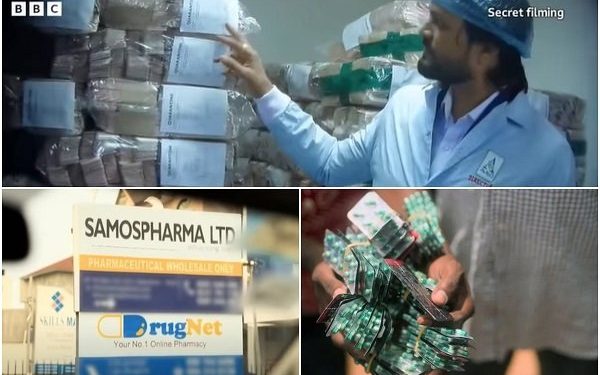Ghana’s Silent Opioid Crisis: How Regulatory Failures Are Fueling a Public Health Disaster
A dangerous opioid crisis is quietly engulfing West Africa, with Ghana emerging as a key entry point for unapproved and highly addictive drugs. An undercover investigation by BBC Africa Eye has revealed that illicit opioid shipments are flooding into the region, facilitated not by underground smuggling rings, but through legal import channels—raising urgent questions about regulatory oversight and government complicity.
Bright Simons, a respected policy analyst, recently took to X (formerly Twitter) to highlight the disturbing findings of the investigation, stating:
“By now, many of us must have watched the BBC Africa Eye documentary about the crazy opioid crisis starting to overwhelm West Africa. A chap by the name of Vinod Sharma runs a pharma company in India called Aveo that has ‘invented’ a poison by mixing two powerful drugs—tapentadol & carisoprodol. The formulation has not been approved anywhere in the world and is thus GLOBALLY ILLEGAL.”
At the heart of this crisis is Vinod Sharma, an Indian pharmaceutical entrepreneur whose company, Aveo, has been shipping these unapproved opioids into West Africa. Despite having no approval from regulatory agencies anywhere in the world, the drug is being openly shipped to Ghana and Nigeria under brand names like Timaking, Tafrodol, and Super Royal-225.
In a startling admission captured on tape, Sharma told undercover journalists that his product is “poison” but remains a lucrative business. When asked about the distribution network, he revealed that Ghana is now the easiest gateway into West Africa, following Nigeria’s move to tighten its borders against such illegal imports.
Bright Simons further exposed the scope of the issue:
“Aveo and some other Indian companies are flooding countries like Ghana & Nigeria with this concoction under brands such as Timaking, Tafrodol, & Super Royal-225. They are also shipping in ILLEGAL, high-dosage forms of tapentadol & carisoprodol as standalone drugs.”
“Vinod acknowledges candidly to the undercover journalists that Tafrodol, for instance, is poisonous. However, in his words, ‘it has become a business.'”
But the real shocker isn’t just the existence of these drugs—it’s the identities of those helping to import them. Documents and customs intelligence show that Ghana’s biggest opioid importer is a company called Samospharma, which by November 2024 had imported more than $6 million worth of opioids from Indian manufacturers like PRG Pharma. Even more troubling, Samospharma is not an obscure entity—it is run by respected figures in Ghana’s pharmaceutical industry, who have previously advised the government on drug regulations and e-pharmacy initiatives.
Simons highlighted this contradiction, writing:
“By November 2024, Samospharma had imported more than $6 million of opioids and other drugs from PRG Pharma of India, for instance. It also imported perfectly legal ‘eye drops’ from the likes of Zuche and Indiana Pharma.”
“As was shown in the documentary, Samospharma and its three founders are the main business partners of Vinod and Aveo in Ghana, as well as of Aveo’s sister company, Westfin. Of the $20 million worth of opioids that Aveo has shipped to the region in recent times, Samospharma was responsible for about 12%.”
A System That Looks the Other Way
Unlike traditional drug smuggling operations, these opioids are not entering Ghana through hidden shipments or forged paperwork. Instead, Samospharma and its business partners have legally cleared these products through customs—despite not registering them with Ghana’s Food and Drugs Authority (FDA).
This raises a disturbing question: Why has Ghana’s regulatory system allowed these shipments to pass through unchecked?
Simons’ analysis continues:
“Most bewildering of all, they have NOT been smuggling in these opioids. They have been OPENLY importing them into Ghana. Attached, see a list of bills of lading covering some recent shipments. The Ghanaian authorities have been authorizing clearance even though Samospharma hasn’t registered any of these products with the FDA.”
When confronted by the BBC Africa Eye team, Ghanaian authorities attempted to shift blame, claiming that importers were acting illegally. However, the documentary’s findings suggest otherwise. The evidence shows that Ghana’s customs and regulatory agencies have been authorizing these shipments—despite growing concerns about opioid addiction in the region.
The Expanding Crisis
In recent years, West Africa has seen a surge in opioid abuse, driven by easy access to dangerously potent substances. What makes the current crisis particularly alarming is that these drugs are being imported openly and in industrial quantities. Aveo alone has shipped $20 million worth of opioids to West Africa, with Samospharma accounting for a staggering 12% of the total supply.
According to customs records, a significant portion of these shipments is financed by Sahelian merchants based in Niamey, Niger, but Samospharma stands out as the leading Ghanaian importer. This suggests a well-coordinated and highly profitable trade network operating with apparent immunity.
Who Is Protecting the Public?
The revelations from BBC Africa Eye expose not just corporate malpractice but also systemic regulatory failure. If a company like Samospharma—whose founders are regarded as pioneers in Ghana’s pharmaceutical sector—can legally import unregistered opioids, then what does this say about the integrity of Ghana’s drug enforcement mechanisms?
Simons summed it up bluntly:
“It is very clear that Ghana is happily letting these opioids through. Even now. Despite the loud protests about the addiction epidemic opioids are causing. Despite the occasional seizures and bonfires. Ghana’s ports remain open. What exactly is the national policy here?”
This crisis is unfolding at a time when opioid addiction has already crippled entire communities in North America and parts of Europe. If West African governments fail to take decisive action, the region could face a full-blown public health emergency, with devastating social and economic consequences.
A Call for Urgent Reform
As Ghana’s role in this crisis becomes clearer, several urgent actions must be taken:
- Immediate crackdown on illegal opioid imports: Ghanaian authorities must ban all unregistered opioid shipments, particularly those linked to Aveo and its distributors.
- Regulatory overhaul: The Food and Drugs Authority (FDA) and Ghana Revenue Authority (GRA) must explain why these shipments were cleared without proper registration. Urgent investigations must be launched into officials who authorized these imports.
- Legal accountability for importers: Samospharma and other companies involved must be investigated and held accountable if they knowingly facilitated the opioid crisis.
- Regional cooperation: Ghana, Nigeria, and other West African nations must coordinate efforts to block illicit opioid flows and tighten pharmaceutical regulations.
The evidence presented in BBC Africa Eye’s documentary should serve as a wake-up call. Without swift and decisive intervention, Ghana risks becoming the epicenter of West Africa’s opioid catastrophe—with dire consequences for the country’s public health, economy, and national security.









this is really not good enough for the country Ghana and Africa as well